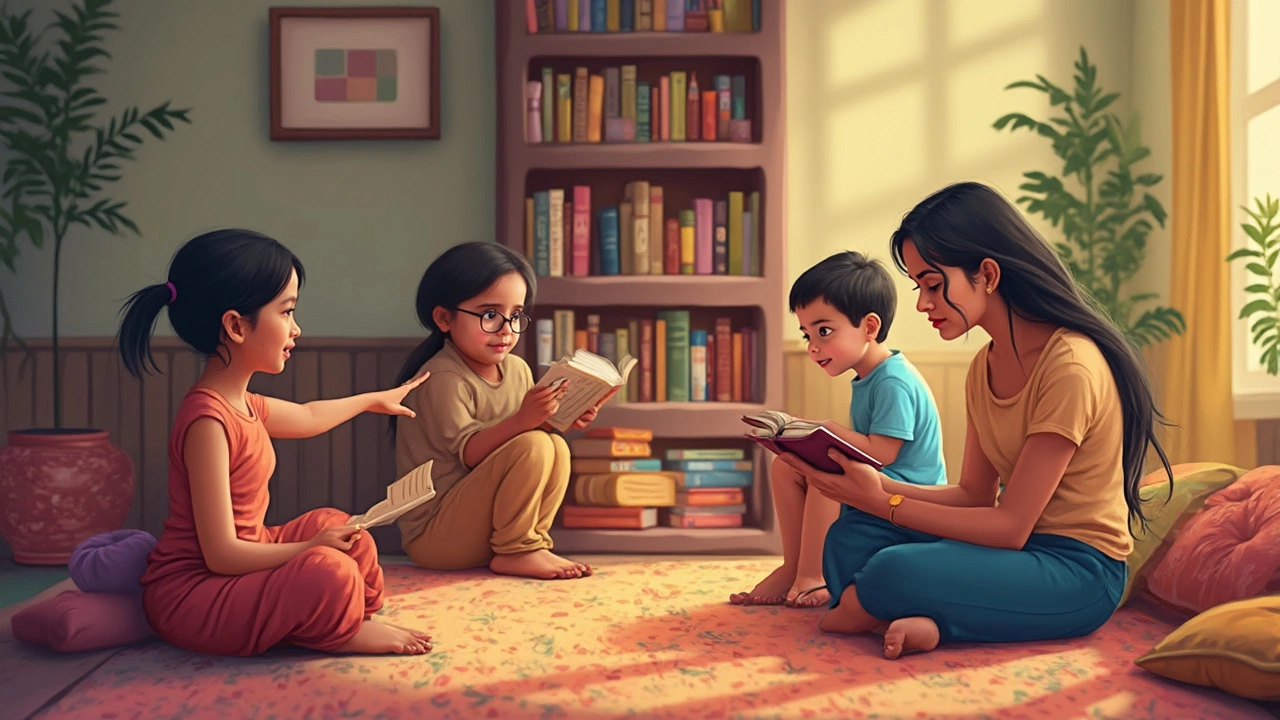What to Read When You Don't Know What to Read: Quick Picks and Smart Tips
 May, 26 2025
May, 26 2025
You’re standing in front of a packed bookshelf, or swiping through endless recommendations online, but nothing jumps out. That ‘what now?’ moment hits everyone—even people who read a ton. Sometimes you want a book that feels just right without spending hours searching, only to give up and scroll social media instead.
If you're feeling stuck, forget the old advice about following bestseller lists or classic must-reads. The trick is figuring out what really sparks your mood today. Maybe you’re tired, busy, or just want something different. It’s way easier to enjoy reading when you give yourself options instead of hunting for ‘the perfect’ book. There’s stuff you can do right now—like speed-skimming a first chapter or jumping into an audiobook sample—to snap out of the reading rut. It doesn’t have to be complicated.
I’ve been there too: frozen by choice, flipping between the same suggestions, or feeling like reading has to be productive. Here’s the thing—reading is supposed to be fun. Let’s talk about shortcuts and tips that actually work, so you can land on your next read fast and get that feeling back.
- Why We Hit a Reading Block
- Simple Ways to Discover Books
- Trying Out Different Genres
- Book Hacks and Tech Tools
- Building Your Tsundoku (To-Be-Read) List
Why We Hit a Reading Block
Ever stare at a stack of books and just feel... nothing? You’re not alone. There are solid reasons behind reading slumps, and knowing why it happens makes it easier to break out of one.
One big cause is simple overwhelm—too many options can freeze decision-making. A UCLA study found that people are less likely to choose anything at all when faced with too many choices. So if you’ve got a hundred unread titles, your brain short-circuits and hits pause.
Sometimes it’s burnout. If you’ve pushed through a long or complicated book, your brain needs a breather. Even people who read regularly run into this, especially after finishing a major fantasy series or a dense nonfiction work.
Another culprit? Mood mismatch. Our brains crave different things on different days. If you’re tired or anxious, a heavy drama is probably just not going to land. A report by Goodreads in 2023 found that readers are more likely to abandon books that don’t fit their mood, with about 38% admitting they ditch books mainly for that reason.
Daily life matters too. Stress, changes in routine, or even too much screen time can drain your motivation to pick up a book. Plus, when your attention is pulled in a dozen directions—work messages, social media, streaming shows—focusing on one story can feel like a chore.
Here’s a quick view of the main reasons for reading blocks and how common they are, based on a survey from Book Riot (2024):
| Reason for Block | Reported by Readers (%) |
|---|---|
| Too many choices | 41 |
| Not in the right mood | 38 |
| Burnout after heavy books | 29 |
| External stress/life events | 34 |
So, getting stuck doesn’t mean you’ve lost your love of book recommendations or reading—it’s just your brain asking for a new way in. Spotting the real roadblock is the first step to shifting out of it.
Simple Ways to Discover Books
Getting stuck on what to read doesn't mean your choices are dry—sometimes there's just too much out there. If you want to find something that actually clicks, you have to look beyond your usual spots. Here’s what works for real people.
- Use book recommendation sites and apps: Sites like Goodreads, The StoryGraph, and Book Riot are gold for customized picks. Goodreads is like one big reading club. Plug in a few of your past favorites and its algorithm churns out surprisingly personal recommendations.
- Ask real people—your friends, or even the barista at your coffee shop. People love sharing what they’re into, and you get legit honest feedback. Bonus: it often steers you away from the over-hyped stuff.
- Podcasts and YouTube channels: Quick search and you’ll get lists of “Best Books for…” everything—road trips, heartbreak, jumpstarting a bored brain. BookTubers like Jack Edwards or the “What Should I Read Next?” podcast can surprise you with hidden gems.
- Go to your library’s new releases section: Libraries aren’t just about dusty shelves. The new releases table always has what’s trending (but not necessarily mainstream), and the staff pick shelf is a prime spot for offbeat choices.
- Check out award winners or shortlists: Not just the big trophies like the Booker or Pulitzer. Awards like the Hugo (sci-fi/fantasy) or Edgar (mystery) are stacked with books even serious fans miss on their own.
Here’s a table showing what kind of book sources people trust the most—pulled from Pew Research’s 2023 survey on American reading habits:
| Source | % of Readers Who Trust This Source |
|---|---|
| Word of Mouth (Friends/Family) | 44% |
| Online Reviews (Goodreads, Amazon) | 28% |
| Social Media (TikTok, Instagram, BookTube) | 17% |
| Librarians/Bookstore Staff | 9% |
| Book Awards/Shortlists | 2% |
The key? Don't overthink it. Just pick something, trust your gut, and try a few pages. If it’s not working, drop it fast and move to the next. That’s how you keep reading fun and spontaneous, instead of a chore.

Trying Out Different Genres
People usually stick to one or two genres, but branching out can totally change your reading experience. It’s not uncommon for mystery fans to find themselves hooked on memoirs or for sci-fi lovers to get pulled into historical fiction. You don’t have to marry a genre—you just have to give something new a shot now and then.
Here’s a quick rundown of why trying different genres matters:
- Book recommendations are easier to find when you aren’t limiting yourself. You'll spot new releases and hidden gems everywhere, not just from the same old lists.
- Different genres test your tastes. You might think you hate fantasy, but maybe you’ve just never found the right author.
- Switching genres breaks up reading slumps. Sometimes all it takes is one wild horror story after a string of romance novels to get your momentum back.
If you’re game to experiment, start by picking a genre you usually avoid or know nothing about. Not sure where to start? Here’s a basic cheat sheet with typical features of popular genres:
| Genre | Quick Facts | Starter Book (Well-Known Example) |
|---|---|---|
| Mystery/Thriller | Fast-paced, twists, crime-solving | "The Girl with the Dragon Tattoo" by Stieg Larsson |
| Science Fiction | Tech, space, future worlds, big ideas | "Dune" by Frank Herbert |
| Fantasy | Magic, epic journeys, unreal worlds | "The Hobbit" by J.R.R. Tolkien |
| Nonfiction (Memoir/Biography) | Real people, real stories, life lessons | "Becoming" by Michelle Obama |
| Historical Fiction | True events mixed with fiction, different eras | "The Book Thief" by Markus Zusak |
According to a Pew Research Center survey in 2023, about 72% of adult readers in the US said their favorite book in the past year was from a genre they don’t usually pick. That's a strong sign there's good stuff outside your usual lane.
If a whole new genre sounds intense, try short stories or novellas. They’re short, so there’s less pressure to commit. Most libraries and apps now highlight award winners or fan favorites in each category, making it easy to grab a sample and see what clicks. When you mix things up, your future self might thank you for discovering a style you never expected to love.
Book Hacks and Tech Tools
Ever spent more time looking for a book than actually reading one? That’s where smart hacks and tech come in handy. There’s no shame in getting a little help from gadgets and apps to make finding your next read a breeze. With a few quick tricks, you can skip the decision fatigue and actually enjoy reading again.
First up, if you can't decide, try sample reading. Most ebook stores—like Kindle and Apple Books—let you download the first chapter or two for free. It’s an easy way to check if a book’s style clicks without any commitment. If you’re on a time crunch or stuck in traffic, audiobooks from Audible or Libby can turn dead time into reading time. Libby’s cool because it’s totally free with a library card, and you’d be surprised by how many new releases you can grab right away.
Discovering new reads can be way simpler with the right recommendation engines. Instead of relying on random blogs, check tools like Goodreads’ “Readers Also Enjoyed” or “BookBub.” Both show you popular books readers like you actually picked up, so you avoid echo chamber suggestions. BookRiot and What Should I Read Next? are also pretty straightforward—just punch in your favorite book or author, and boom, you get smart suggestions based on reader trends, not just paid promos.
If you want to stay organized, try apps like Notion or Trello to keep a running list of what you want to read next. Create a backlog, rank your interest level, or even set fun challenges. This way, you’ll never blank out when thinking about what’s on your personal reading radar.
- Use ebook samples to test-drive before you commit.
- Switch up formats: ebooks and audiobooks count as reading, too.
- Lean on recommendation engines like Goodreads, BookBub, or What Should I Read Next?
- Make your own TBR list in Notion, Trello, or even just your phone’s notes app.
One last thing: Don’t get lost in the “what to read” rabbit hole. With recommendation engines and reading tools at your fingertips, finding good book recommendations is easier than ever. Cut the stress, try a hack or tool, and get back to enjoying stories.

Building Your Tsundoku (To-Be-Read) List
Ever bought books that just stack up, unread? That’s tsundoku—a real word from Japan for the pile of books you keep planning to read. It’s not a bad thing, though. Having a solid to-be-read list means you’re never out of options when you need them. And there’s a smart way to build a TBR pile that works for you, not against you.
Instead of collecting random titles, get a bit strategic. Whenever you spot a book that interests you, note it down right away—don’t trust your memory. There are even free apps for this, like Goodreads or StoryGraph. Both let you quickly add book titles from a scan or online search. If you’re more old school, keep a running list in your phone notes. This way, you won’t spend ages trying to remember that one book a friend mentioned at lunch.
If you tend to scroll TikTok or Bookstagram, you can save recommendations directly or screenshot them. A lot of people find great recs in subreddit threads like r/books or r/suggestmeabook, where readers post their book recommendations for all reading moods. It’s quick and usually way more honest than the big review sites.
Some readers even make a habit of setting up “book jars”—basically a jar filled with slips of paper, each with a book title from your list. When you don’t know what to read, pull one out and go for it. It takes decision fatigue right off the table. Others organize their TBR lists by mood or genre, so on a lazy Sunday or after a rough day, you can just check what fits your vibe.
- Use an app or note for your to-be-read books.
- Save recommendations you see online—screenshots count!
- Ask friends or online communities for new titles.
- Sort your list by mood or genre for quick picks later.
- Try a book jar if you like leaving things to chance.
Your TBR doesn’t have to be perfect or even finished. The point is having a stash to pick from when the reading mood hits and you’re not sure where to start. If the pile grows big, that just means you’ll never run out of options.